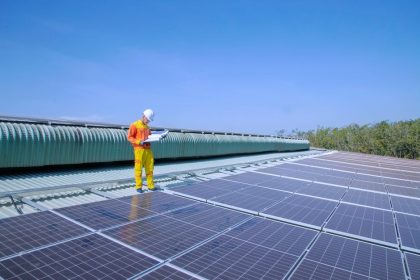Are you a business owner? Are you looking to save money on energy bills while also reducing your carbon footprint? Look no further than commercial solar! Not only does installing a solar system provide long-term financial benefits.
There are also many incentives available that make the switch even more appealing. In this blog post, we’ll explore some of the top commercial solar incentives for businesses.
Check how they can help you take advantage of all that renewable energy has to offer.
Are you interested in learning more? If so, read on.
Federal and State Tax Incentives for Businesses
Commercial solar panel incentives for businesses can be an attractive cost-saving option. They can generate financial returns and tax advantages. Federal and state government tax incentives are available to businesses on every level.
Solar photovoltaic installers and other forms of renewable energy technology enjoy this benefit. The federal tax incentive allows businesses to deduct 30% of the cost. This is from the installation of solar-energy systems from their federal taxes.
On the state level, solar-energy incentives vary. These often include credits, solar panel rebates, and exemptions from property taxes. Some states also offer cash-back incentives that help businesses buy and install their solar energy systems.
Rebates and Grants
Businesses today are facing the ever-increasing cost of utility usage. There is one way that businesses are responding to these increasing costs. This gets credited through commercial solar incentives for businesses.
These incentives come in two distinct forms: utility rebates and grants. Utility rebates offer businesses a form of financial reward. It is for their long commitment to solar energy. This is in the form of a reduced bill or an actual monetary rebate.
Grants offer lump sums of money. This is to help businesses offset the cost of solar installation. Taking advantage of these incentives can make a big difference in cost.
Both of these incentives can be a great way for businesses to start reducing their electric bill. This is inspiring more businesses to take advantage of solar.
Net Metering Policies
Businesses around the world are beginning to see the value and potential of commercial solar. This is in both financial and environmental terms. Abundant incentives and net metering policies make it an attractive alternative.
Net metering policies expand the array of business sectors. This policy refers to the bill of credits for excess energy. These policies get produced by the commercial solar industry. This results in a decrease in energy bills.
This can enable businesses to save money through tangible costs. as it’s a direct correlation between solar energy generated and credits on the bill. Make sure to take advantage of net metering policies. With this, businesses have the potential to reduce energy costs.
This is while benefitting their communities and the environment. Governments have created various incentives. They also have tax reliefs to further encourage the adoption of solar energy.
SRECs
State rebate programs are different from one state to the next, but most offer a rebate per kilowatt (kW) for adding solar panels. For example, California gives a rebate of $1.80/watt for systems up to 1 megawatt (MW), while New Jersey gives a rebate of $0.50/watt for systems up to 50 kilowatts (kW).
SRECs, or solar renewable energy credits, are another way that businesses can save money by going solar. SRECs are credits that can be bought and sold. They show how good for the world power from renewable sources like solar is.
One SREC is the same as one megawatt-hour (MWh) of energy made from green sources. How many SRECs a PV system makes and how much they are worth depends on the size of the system and the rules in the state where it is located.
Utility Company Offers and Programs
The acceptance and availability of commercial solar energy are increasing. This has created new opportunities for businesses. This is to take advantage of cost-effective energy solutions. Utility companies have been quick to recognize the potential savings of solar energy.
They have implemented their incentives and programs. This is to encourage businesses to switch their energy sources. These offers can include bonuses for businesses. This gets converted to solar energy, discounted installation fees, and utility bill credits.
The utility may even buy excess electricity generated by the business’s solar system. It creates another incentive for businesses to make the switch. They all share the common goal of helping businesses reduce their energy costs.
This is while doing something good for the environment.
Financing Options Available to Businesses
Solar energy incentives for businesses remain a viable and cost-effective option for businesses. This is to reduce energy costs and lower their environmental impact. Commercial solar incentives get designed to help businesses cover the costs.
This is associated with installing solar power as well as any associated taxes. These incentives can be found at the federal, local, and state levels. Financing options available to businesses for obtaining commercial solar incentives include the following:
- Low-interest loans from government programs
- Subsidized rate incentives from power companies
- Tax credits and deductions
- Long-term financing options from traditional lenders
With today’s long-term incentives and financing options the cost of implementing commercial solar technology has become extremely attractive. This is good for business owners.
The return on investment has proven itself to be one of the most cost-effective forms of energy.
State and Local Government Subsidies
State and local government subsidies continue to be key factors. This is in the increasing development of commercial solar energy for businesses. Through this, businesses can reduce their installation.
It also affects operating and maintenance costs related to deploying solar energy systems. Solar energy provides an intriguing economic opportunity for businesses wanting to become more eco-friendly and reduce their energy costs.
Many governments provide a variety of incentives for residential solar energy systems. Businesses are likely to receive larger grants and subsidies with greater rewards for their commercial solar investments.
This makes it easier for businesses to make the switch to solar energy and allows them to realize huge returns on their investment.
Low Maintenance Costs
Commercial solar incentives for businesses provide cost savings on electricity bills, fuel the shift toward green energy and help the environment. Compared to traditional energy sources, running a solar energy system requires very little maintenance.
This results in lower costs in the long run. Businesses that choose to use solar energy can enjoy incentives.
This includes tax credits and grants that are available to them. These incentives not only reduce initial installation costs. It also helps offset any maintenance costs that may arise.
As such, businesses can be sure that both a low upfront cost and low long-term costs make solar energy an attractive option.
Accelerated Depreciation
Accelerated depreciation is a tax accounting method that lets businesses write down the cost of assets faster than standard straight-line depreciation. This means that businesses can subtract a bigger chunk of the cost of the asset from their taxes in the first few years they own it. This can save them a lot of money in taxes.
Under the government tax system called the Modified Accelerated Cost Recovery System (MACRS), solar panel systems are considered five-year property, which means that they can be depreciated over a period of five years. This means that businesses can subtract 20% of the cost of the solar panel system from their taxes every year for five years, for a total depreciation of 100%.
Businesses that install solar panel systems can benefit from accelerated depreciation because the cost of the system upfront can be high. By spreading the cost of the system out over a shorter time period, companies can lower their taxable income and tax liability, which makes installing solar panels more affordable.
It’s important to remember that accelerated depreciation is a way to figure out your tax bill. It doesn’t change how long the object will last or how useful it will be. Also, businesses should talk to their tax advisors to find out if rapid depreciation is the best choice for them given their particular situation.
Taking Advantage of These Incentives
By taking advantage of these incentives, businesses can reduce their electricity costs. This reduces their environmental impact. It differentiates their business from other businesses in the same industry.
Take advantage of commercial solar incentives. Make sure to read more information about the benefits. Compare their options, develop a comprehensive business plan, and explore financing options.
Research the right incentives and test their affordability. With this, businesses can make informed decisions. This is about the best incentive for their business and energy needs.
Learn All About the Commercial Solar Incentives for Businesses Today
The future of sustainability and renewable energy is solar. Businesses large and small can take advantage of commercial solar incentives. They save money on energy costs while helping the planet.
With responsible solutions and long-term investment, companies can provide secure energy resources for generations to come. Start saving now with commercial solar incentives! Contact the best Solar renewable solutions for more information.
Did you find this article helpful? Check out the rest of our blogs!





